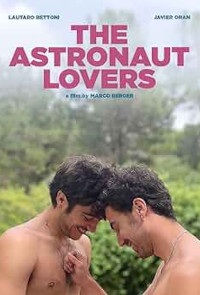| SHADOWS ON THE WALL | REVIEWS | NEWS | FESTIVAL | AWARDS | Q&A | ABOUT | TALKBACK | |||||||||||||||||||||||||||||
 Shadows off the beaten path Shadows off the beaten pathIndies, foreign, docs and shorts...
On this page:
THE ASTRONAUT LOVERS |
NIGHT STAGE |
SOME NIGHTS I FEEL LIKE WALKING
| |||||||||||||||||||||||||||||
| See also: SHADOWS FILM FESTIVAL | Last update 6.Apr.25 | |||||||||||||||||||||||||||||
|
The Astronaut Lovers Los Amantes Astronautas Review by Rich Cline | 
 Is it streaming?
| 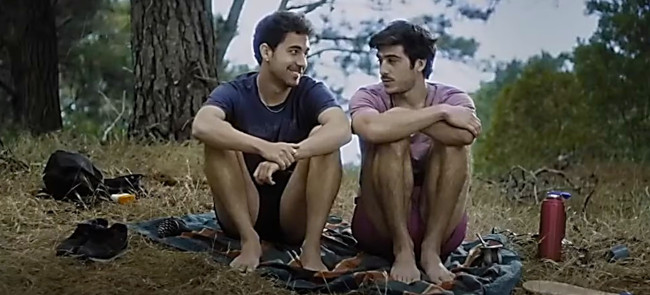 Smart and very funny, this romcom from Argentina takes an audacious premise and spins it with snappy dialog that playfully references a wide range of movies along with the titular metaphorical running gags. Writer-director Marco Berger is taking another sexy, nuanced look at issues of masculinity and identity, avoiding cliches while playfully remaining faithful to the genre. Indeed, he includes an unapologetic romance that sneaks in through character-based wit. At a beach house outside Buenos Aires, Pedro (Oran) arrives to spend the summer with a group of 20-something friends including Maxi (Bettoni), a cheeky guy who remembers Pedro from summer camp a decade ago. Their friendship picks up quickly, and Maxi becomes fascinated that Pedro is now openly gay. When they run into Maxi's ex Sabrina (Sala), they jokingly pose as a couple. Then after another dare, they pretend to be a couple with their friends in the house. The question is whether their affection is more romantic than they suspect it is. Berger is always terrific at capturing the relaxed physicality of groups hanging out in close quarters, so there's a close connection between these people as they lounge around watching movies in the warm summer air, walk in the woods or get some sun on the beach. The dialog snaps with improvisational authenticity, especially as Pedro and Maxi catch up with each other and reveal their more personal thoughts and feelings. And Maxi confesses that Sabrina broke up with him because she thought he was gay. These kinds of things spark ideas that push Pedro and Maxi together while also placing obstacles in front of them. They're played beautifully by Oran and Bettoni in open-handed performances that are warm and sometimes wrenchingly honest. Which of course makes them hugely likeable. The flirtation between the two of them, which extends to spicy banter with everyone else, is lusty and very funny, emerging from the characters in easy riffs. Little touches add interest, such as the fact that there's no internet in the house, so they must visit a local shop to rent films on videotape. And Berger has some fun depicting Pedro's deeper thoughts in fantasy moments. It's thoroughly entertaining to watch these men pretend that the attraction they feel isn't real, which allows deeper themes to blossom along the way. And the most powerful idea is that sexuality is more about love than sex.
|
| Night Stage Ato Noturno Review by Rich Cline | 
| 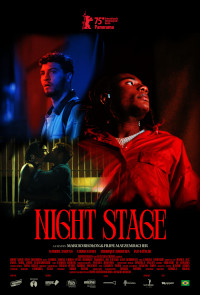 dir-scr Filipe Matzembacher, Marcio Reolon prd Filipe Matzembacher, Marcio Reolon, Jessica Luz, Paola Wink with Gabriel Faryas, Cirillo Luna, Henrique Barreira, Ivo Muller, Kaya Rodrigues, Larissa Sanguine, Gabriela Grecco, Antonio Czamansky release UK Mar.25 flare 25/Brazil 1h57 BERLIN FILM FEST  Is it streaming?
| 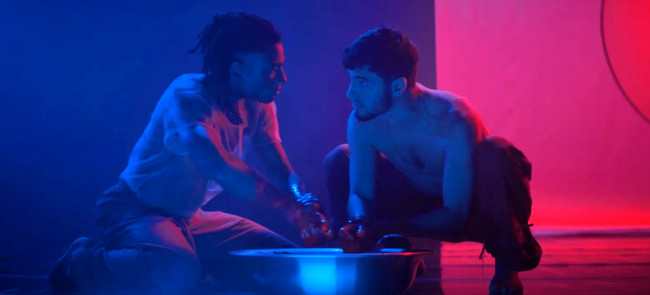 From the opening shot, this Brazilian drama channels the surging operatic sensibilities of Brian De Palma's 1980s erotic thrillers. But what's coming is thoroughly rooted in the present day, mixing more open-minded public opinion with ideas that are still transgressive. Filmmakers Filipe Matzembacher and Marcio Reolon create a wonderfully lurid visual sensibility alongside characters who are complex, shady and likeable. And they delight in making us think. In Porto Alegre, actor Matias (Faryas) has his first break in a physical theatre performance alongside his flatmate Fabio (Barreira), competing live on-stage each night to deliver the climactic monolog. And they are also contending for the lead in a TV series that Pamela (Rodrigues) is casting. Meanwhile, Matias sparks with Rafael (Luna) when they meet on a hookup app. But Rafael is a candidate for mayor, and their predilection for having sex in public could jeopardise his campaign. It also could get Matias fired. The question is whether they will choose ambition or passion. Circling around them is Rafael's security officer Camilo (Muller), a murky figure who watches everything, devising his own plans. And it takes awhile for us to learn what he is capable of. All of this creates a clenching suspense that continually shifts as the story unfolds, spilling into personal friendships and professional connections. But while everything on-screen is heightened to look like a swelling melodrama, the performances remain earthy and honest. Faryas is hugely likeable as the bright-eyed Matias, excited that his dream is finally coming true, both in his career and in finding someone to love. His connection with Luna's wary but deeply interested Rafael is beautifully played, with nuances that transcend their kinks. Each is on the brink of wild success, and yet they are also on the verge of throwing it away. Barreira has superb presence as the jealous Fabio, and Muller is marvellously menacing as Camilo lurks in the shadows. With rich-hued cinematography by Luciana Baseggio and a swelling musical score, the film pulls us deeply into the story's intrigue, which is rooted in the connections between the characters. The story's provocative angle is that being gay doesn't present a problem for either Matias or Rafael; it's their outrageous public behaviour that puts them in danger. Stir in some sabotage, blackmail and even murder, and the movie becomes almost shamelessly entertaining.
|
| Some Nights I Feel Like Walking Review by Rich Cline | 
| 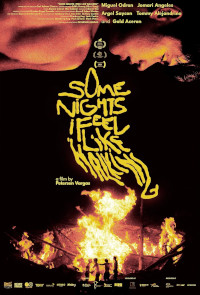 dir-scr Petersen Vargas prd Alemberg Ang, Jade Castro with Miguel Odron, Jomari Angeles, Argel Saycon, Tommy Alejandrino, Gold Aceron, Jess Mendoza, Moira Lang, Dennis Marasigan, Vic Robinson, Andre Miguel, Paolo O'Hara, Timmy Harn release UK Mar.25 flare 25/Philippines 1h43  Now streaming...
| 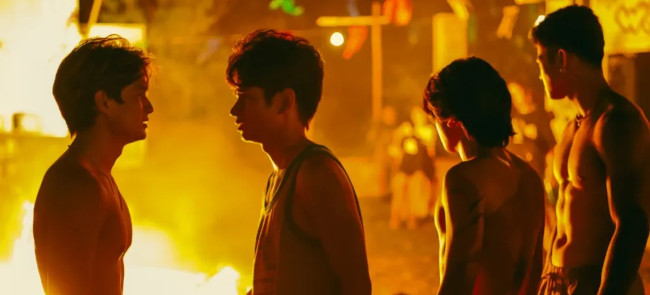 Lush cinematography captures colours and textures, creating a vivid backdrop for this gritty Filipino drama about a group of teens who run wild in the streets. The plot sends them on an odyssey that's strongly involving, largely because the characters and situations are so complex. Writer-director Peterson Vargas includes a terrific mix of emotions in these found brothers who care for each other in the face of hatred. In Manila, teen runaway Zion (Odron) meets street hustler Uno (Angeles) and his friends: charismatic leader Bay (Saycon), shaggy Rush (Alejandrino) and young Ge (Aceron). Constantly harassed by the police, they live together in a boarding house and ostensibly work as masseurs, looking for clients in cruisy porn cinemas. When Ge has a nasty drug overdose, the boys decide to take him back to his home village. Along the way, Zion and Uno begin to bond on a deeper romantic level. And when they get to Ge's hometown, a festival is in full swing. Shot using handheld cameras that follow these boys as they race through alleyways, the film mixes their cheeky energy with an urgent underlying tension that relates to their fragile position in society. It quickly becomes clear that Zion is from a wealthy family, which the imposing Bay uses to threaten him. But then, Bay also makes homophobic threats against the openly gay Uno, even though he's essentially the only family he has. And there's also tenderness between them. Odron plays Zion with a terrific mixture of naivete and steely confidence. He wants to belong to this group but knows he doesn't, which affects how he interacts with Uno, even though they clearly like each other a lot. Angeles' Uno is particularly emotional, following his feelings. This makes him very likeable, especially because he wants to get out of this situation. And maybe Zion can help. As Uno says, "This work brainwashes us into thinking that we don't own anything, including our bodies." And he longs to have more ownership of himself and his future. This gives the film a warm counterplot to the gritty central narrative. Then in the final act, things begin to turn surreal in the countryside, with a dream sequence, a quick-descending mist and a shock of bigotry. Then in what seems to be a queer utopia, the film turns inward.
| 
See also: SHADOWS FILM FESTIVAL © 2025 by Rich Cline, Shadows
on the Wall
HOME | REVIEWS | NEWS | FESTIVAL | AWARDS
| Q&A | ABOUT | TALKBACK | | ||||||||||||||||||
